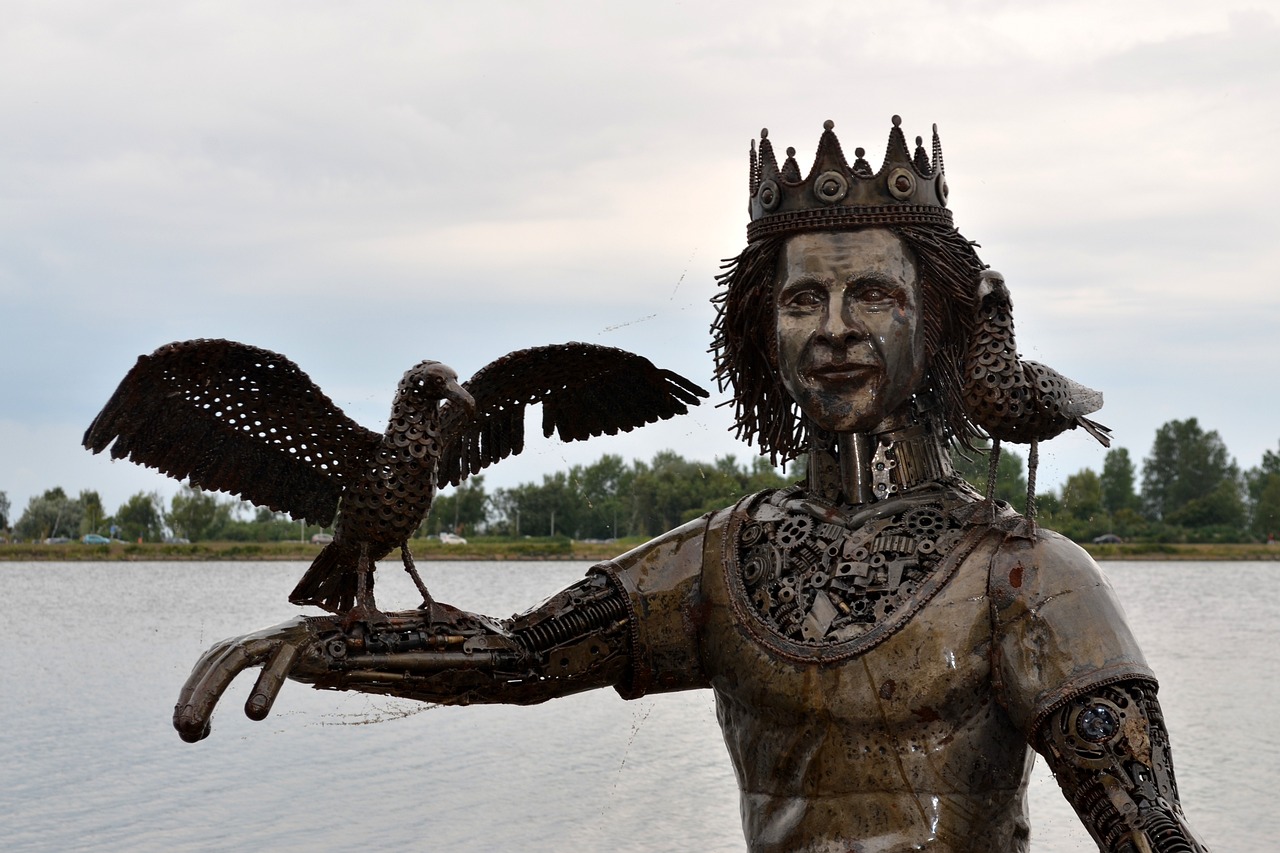This resource draws extensively upon the contents of Our Troth Vol. 2, with the publisher kindly allowing free access for all Heathens. The text has been thoroughly adapted for online readability, and readers are encouraged to explore the original book for a wealth of information and an annotated bibliography.
Njord
Niærþer, Njǫrun; Njǫrðr
Njord is invoked for favorable sailing conditions and luck at sea. He resides in Nóatún, meaning “Ship Enclosure,” where his wife Skadi often complains about the constant sounds of seabirds and waves while they attempt to coexist in this environment (Grímnismál 16; Gylfaginning 23). Freya Alfredsdotter perceives all nurturing havens as elements of Nóatún, be it in sheltered bays, rivers, or lakes (“Hearing the Pointed Guidance of Njord,” pp. 12-13). Historically, the northern European peoples have greatly relied on both land and sea for sustenance and prosperity.
Origins
Some Heathens connect the deity Nerthus, referenced by Tacitus in Germania, with Njord, believing they may reflect different facets of a deity transcending gender. Their potential similarities contribute to this perspective, though historical literature offers little detail:
Tacitus was the sole historical source mentioning Nerthus, calling her “Mother Earth” worshiped in the region of what is now southern Jutland (Germania 40), yet no further references exist. Contrastingly, Njord’s narrative is preserved in the Eddas and sagas recorded over a millennium later. Notably, the etymology of their names reveals a shared Indo-European root *ner- signifying “strength” (as seen in Old Irish nert, Greek anēr, and Latin neriosus). Their respective names may also connect to other roots denoting concepts like “diving,” “dancing,” or “satisfaction” (as suggested by Old English). In essence, their attributes appear to enhance one another, both being associated with earth and water, promoting peace and wealth.
Njord’s Symbols
The Ship and the Wagon
Snorri notes a “wagon-god” (vagna guð) reference to Njord within the lore (Skáldskaparmál 6). Although direct accounts of wagon rituals dedicated to Njord are sparse, it’s plausible he was honored similarly to his counterpart Nerthus and son Freyr. Njord’s connections to wealth link him with precious metals like silver and gold. The Vikings were adept traders, utilizing these metals in commerce, with some viewing Njord as overseeing market transactions, balancing prosperity and nature’s resources.
Hatchets
While Freyr and Freyja embody warrior traits, Njord is recognized as a guardian of peace and is never depicted in battle, even during Ragnarok. However, Viking shipbuilders, utilizing axes for construction, may suggest a symbolic association of Njord with well-crafted tools suited for shipbuilding rather than warfare.
Njord in Medieval Literature
The Generous God
Njord is portrayed as a wealthy deity capable of bestowing riches (Gylfaginning 23), often referred to as gefanda guð, “the giving god” (Skáldskaparmál 6). The saying “as rich as Njord” emphasizes his legendary wealth (Vatnsdoela saga 47). Furthermore, Snorri notes his control over winds and fire (Gylfaginning 23). In Ynglinga saga 9, he is likened to a mythical Swedish king whose reign brought peace and prosperity, leading people to ascribe agricultural bounties to his influence (ÍF 26, p. 23).
Njord the Peacekeeper
Njord embodies qualities of both peace and prosperity, akin to Freyr Yngve. Described as “prince of men, lacking harm” (Grímnismál 16), this duality intrigues. The peace between the Æsir and Vanir was established through mutual exchange, with Njord residing among the Æsir as a means to ensure harmony. Loki’s insults in Lokasenna suggest Njord’s reputation as a pacifist, further adding to his characterization during these exchanges.
Njord: The Tranquil Lord
In Skáldskaparmál, Njord’s most well-known tale centers on his reluctant marriage to Skadi, where they fall victim to incompatible lifestyles—he thrives by the sea, while she prefers the mountains, ultimately parting ways (Skáldskaparmál G56). The focus on Njord’s feet—a subject never truly explained—opens possibilities reflecting the audience’s familiarity with his qualities over others’.
Freyr and Njord: Partners in Peace
Njord is frequently paired with Freyr, hinting at their collaborative influence in the divine realms. The Icelandic oath-taking expressions reaffirm the community’s allegiance to both deities (Landnámabók H270, ÍF 1, p. 315). At religious gatherings, health and prosperity were invoked in toasts honoring both gods (Hákonar saga ins goða 14). Njord’s role as a priest among the divine, coupled with evidence of his worship in regions of Norway, highlights his significance.
Njord Today
Modern practitioners view Njord positively as approachable and generous. Many report experiences where he has shown support and favor. Celebrations in his honor may include water-related activities, coupled with acts of environmental stewardship, aligning with his essence as a deity of waterways.
Njord the Water Lord
Certain Heathens interpret Njord literally as a God of waters and the life they sustain. His endless provision symbolizes the life-giving nature of water, paralleling how society relies on this crucial resource.
Njord the Gracious Lord
While notions of grace are sparse in Germanic narratives, Njord emerges as an exemplary figure of benevolence. He is seen not only as generous but also as one who gives without expectation; his blessings reflect abundance and favor beyond merit.
In today’s practice, Njord embodies a gracious spirit, freely offering abundance and good fortune.



